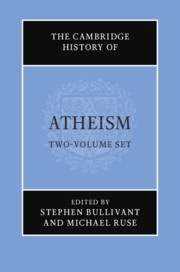Book contents
- The Cambridge History of Atheism
- The Cambridge History of Atheism
- Copyright page
- Dedication
- Contents
- Acknowledgments
- Contributors
- Introduction
- Part I Preliminaries
- Part II Atheisms in History
- Part III Reformation, Renaissance, Enlightenment
- Part IV Classical Modernity: Philosophical and Scientific Currents
- 18 Romanticism
- 19 John Stuart Mill on Religion, Utility, and Morality
- 20 The Physical Sciences
- 21 Charles Darwin and the Darwinians
- 22 Freud and the Unconscious
- Part V Classical Modernity: Social and Political Currents
- Part VI Twentieth and Twenty-First Centuries: Intellectual and Artistic Currents
- Part VII Lived Atheism in the Twentieth- and Twenty-First Centuries: Case-Studies
- Part VIII Emerging Atheisms in the Twenty-First Century
- Part IX Conclusion
- Index
- References
18 - Romanticism
from Part IV - Classical Modernity: Philosophical and Scientific Currents
Published online by Cambridge University Press: 25 September 2021
- The Cambridge History of Atheism
- The Cambridge History of Atheism
- Copyright page
- Dedication
- Contents
- Acknowledgments
- Contributors
- Introduction
- Part I Preliminaries
- Part II Atheisms in History
- Part III Reformation, Renaissance, Enlightenment
- Part IV Classical Modernity: Philosophical and Scientific Currents
- 18 Romanticism
- 19 John Stuart Mill on Religion, Utility, and Morality
- 20 The Physical Sciences
- 21 Charles Darwin and the Darwinians
- 22 Freud and the Unconscious
- Part V Classical Modernity: Social and Political Currents
- Part VI Twentieth and Twenty-First Centuries: Intellectual and Artistic Currents
- Part VII Lived Atheism in the Twentieth- and Twenty-First Centuries: Case-Studies
- Part VIII Emerging Atheisms in the Twenty-First Century
- Part IX Conclusion
- Index
- References
Summary
This entry examines what the charges of ‘pantheist’ and ‘atheist’ meant for both Germans and Britons between the latter half of the eighteenth century through the first half of the nineteenth century. It attempts to clarify the meaning of these labels within, first, German idealism and, second, the cultural milieu of the German and British Romantic era. To accomplish this, it surveys how the figure of Prometheus was employed by Johann Wolfgang von Goethe, Friedrich Heinrich Jacobi, Mary Wollstonecraft Shelley, and Percy Bysshe Shelley to illustrate the relationship between nature, philosophy, God, and man. This narrative arc provides a framework in which to review a number of historical events and key works that will help identify the position of atheism during this period.
- Type
- Chapter
- Information
- The Cambridge History of Atheism , pp. 329 - 345Publisher: Cambridge University PressPrint publication year: 2021

